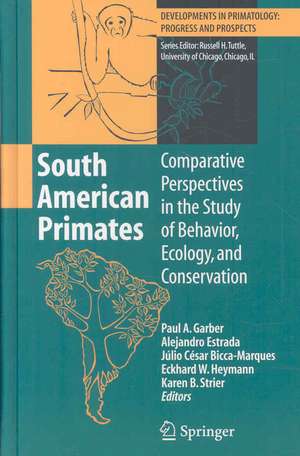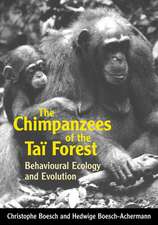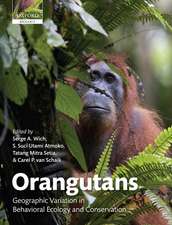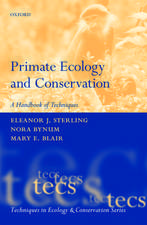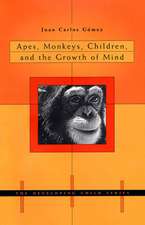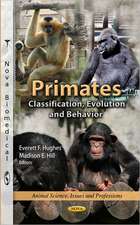South American Primates: Comparative Perspectives in the Study of Behavior, Ecology, and Conservation: Developments in Primatology: Progress and Prospects
Editat de Paul A. Garber, Alejandro Estrada, Julio Cesar Bicca-Marques, Eckhard W. Heymann, Karen B. Strieren Limba Engleză Hardback – 10 dec 2008
| Toate formatele și edițiile | Preț | Express |
|---|---|---|
| Paperback (1) | 1312.34 lei 38-44 zile | |
| Springer – 23 noi 2010 | 1312.34 lei 38-44 zile | |
| Hardback (1) | 1562.94 lei 43-57 zile | |
| Springer – 10 dec 2008 | 1562.94 lei 43-57 zile |
Din seria Developments in Primatology: Progress and Prospects
- 20%
 Preț: 571.31 lei
Preț: 571.31 lei - 18%
 Preț: 1216.65 lei
Preț: 1216.65 lei - 19%
 Preț: 578.66 lei
Preț: 578.66 lei - 18%
 Preț: 956.69 lei
Preț: 956.69 lei - 18%
 Preț: 948.92 lei
Preț: 948.92 lei - 18%
 Preț: 948.92 lei
Preț: 948.92 lei - 18%
 Preț: 945.79 lei
Preț: 945.79 lei - 18%
 Preț: 962.66 lei
Preț: 962.66 lei - 18%
 Preț: 1664.43 lei
Preț: 1664.43 lei - 18%
 Preț: 1224.54 lei
Preț: 1224.54 lei - 24%
 Preț: 826.25 lei
Preț: 826.25 lei - 24%
 Preț: 802.74 lei
Preț: 802.74 lei - 18%
 Preț: 950.21 lei
Preț: 950.21 lei - 18%
 Preț: 943.73 lei
Preț: 943.73 lei - 18%
 Preț: 1549.67 lei
Preț: 1549.67 lei - 18%
 Preț: 1248.20 lei
Preț: 1248.20 lei - 18%
 Preț: 941.38 lei
Preț: 941.38 lei - 24%
 Preț: 800.85 lei
Preț: 800.85 lei - 18%
 Preț: 953.35 lei
Preț: 953.35 lei - 18%
 Preț: 1827.48 lei
Preț: 1827.48 lei - 18%
 Preț: 1209.52 lei
Preț: 1209.52 lei - 18%
 Preț: 957.62 lei
Preț: 957.62 lei - 18%
 Preț: 1231.47 lei
Preț: 1231.47 lei - 18%
 Preț: 1225.48 lei
Preț: 1225.48 lei - 5%
 Preț: 1433.83 lei
Preț: 1433.83 lei - 18%
 Preț: 1231.16 lei
Preț: 1231.16 lei - 18%
 Preț: 1226.90 lei
Preț: 1226.90 lei - 18%
 Preț: 955.25 lei
Preț: 955.25 lei - 18%
 Preț: 956.03 lei
Preț: 956.03 lei - 18%
 Preț: 1218.53 lei
Preț: 1218.53 lei - 18%
 Preț: 950.52 lei
Preț: 950.52 lei -
 Preț: 416.82 lei
Preț: 416.82 lei - 18%
 Preț: 1554.89 lei
Preț: 1554.89 lei
Preț: 1562.94 lei
Preț vechi: 1906.01 lei
-18% Nou
Puncte Express: 2344
Preț estimativ în valută:
299.06€ • 313.09$ • 247.46£
299.06€ • 313.09$ • 247.46£
Carte tipărită la comandă
Livrare economică 07-21 aprilie
Preluare comenzi: 021 569.72.76
Specificații
ISBN-13: 9780387787046
ISBN-10: 0387787046
Pagini: 564
Ilustrații: XVI, 564 p.
Dimensiuni: 155 x 235 x 30 mm
Greutate: 0.98 kg
Ediția:2009
Editura: Springer
Colecția Springer
Seria Developments in Primatology: Progress and Prospects
Locul publicării:New York, NY, United States
ISBN-10: 0387787046
Pagini: 564
Ilustrații: XVI, 564 p.
Dimensiuni: 155 x 235 x 30 mm
Greutate: 0.98 kg
Ediția:2009
Editura: Springer
Colecția Springer
Seria Developments in Primatology: Progress and Prospects
Locul publicării:New York, NY, United States
Public țintă
ResearchCuprins
Advancing the Study of South American Primates.- Taxonomy, Distribution, Evolution, and Historical Biogeography of South American Primates.- The Diversity of the New World Primates (Platyrrhini): An Annotated Taxonomy.- Paleogeography of the South Atlantic: a Route for Primates and Rodents into the New World?.- Platyrrhine Ecophylogenetics in Space and Time.- Recent Theoretical Advances in Primate Behavior and Ecology.- Demographic and Morphological Perspectives on Life History Evolution and Conservation of New World Monkeys.- Long-Term Field Studies of South American Primates.- Sexual Selection, Female Choice and Mating Systems.- The Reproductive Ecology of South American Primates: Ecological Adaptations in Ovulation and Conception.- Genetic Approaches to the Study of Dispersal and Kinship in New World Primates.- Predation Risk and Antipredator Strategies.- Mechanical and Nutritional Properties of Food as Factors in Platyrrhine Dietary Adaptations.- Neutral and Niche Perspectives and the Role of Primates as Seed Dispersers: A Case Study from Rio Paratari, Brazil.- The Use of Vocal Communication in Keeping the Spatial Cohesion of Groups: Intentionality and Specific Functions.- Primate Cognition: Integrating Social and Ecological Information in Decision-Making.- Conservation and Management of South American Primates.- Impacts of Subsistence Game Hunting on Amazonian Primates.- Primate Densities in the Atlantic Forest of~Southeast Brazil: The Role of Habitat Quality and Anthropogenic Disturbance.- Ecological and Anthropogenic Influences on Patterns of Parasitism in Free-Ranging Primates: A Meta-analysis of the Genus Alouatta.- Primate Conservation in South America: The~Human and Ecological Dimensions of the Problem.- Concluding Chapter.- Comparative Perspectives in the Study of South American Primates: Research Priorities and Conservation Imperatives.
Recenzii
From the reviews:
"More than 40 scientists from wide-ranging fields … address comparative perspectives and approaches in the study of the large and diverse radiation of South American primates. … this book is a triumph in providing a crucial summary of the existing and imminent challenges facing the research and conservation of South American primates and their habitats. An important addition for advanced scholars of primatology and related fields. Summing Up: Highly recommended. Graduate students and above." (R. A. Delgado, Choice, Vol. 46 (10), June, 2009)
“The compendium of papers compiled by over 40 scientists, many prominent leaders in their field and/or South American natives, will undoubtedly guide future studies on South American primates. South American primates is divided into five sub-sections, each of which is described in Garber and Estrada's introductory chapter for the more … reader.” (Nicole D. Gross Camp, Ecology, Vol. 91 (1), January, 2010)
"More than 40 scientists from wide-ranging fields … address comparative perspectives and approaches in the study of the large and diverse radiation of South American primates. … this book is a triumph in providing a crucial summary of the existing and imminent challenges facing the research and conservation of South American primates and their habitats. An important addition for advanced scholars of primatology and related fields. Summing Up: Highly recommended. Graduate students and above." (R. A. Delgado, Choice, Vol. 46 (10), June, 2009)
“The compendium of papers compiled by over 40 scientists, many prominent leaders in their field and/or South American natives, will undoubtedly guide future studies on South American primates. South American primates is divided into five sub-sections, each of which is described in Garber and Estrada's introductory chapter for the more … reader.” (Nicole D. Gross Camp, Ecology, Vol. 91 (1), January, 2010)
Textul de pe ultima copertă
South America is home to perhaps the largest and most diversified radiation (some 200 species) of nonhuman primates on Earth. Given the conservation imperative associated with forest destruction and environmental change, and recent increases in the number of primate field studies, the editors of this volume have brought together a distinguished set of primatologists, ecologists, evolutionary biologists, and conservation scientists to examine the nature and range of primate responses to changes in their ecological and social environments, and to use data on South American monkeys to develop models to address critical theoretical questions in the study of primate behavior, ecology, and conservation. Chapters in the volume focus on issues of taxonomy, biogeography and evolution, reproduction and fertility, mating systems, demography and life history traits, genetics and kinship, cognition, feeding adaptations, predation, rainforest ecology, the affects of forest fragmentation on ecosystem health and disease, the impact of human hunting on mammalian communities, and competing pressures for land use between the local human population and the remaining primate population.
Caracteristici
This will be the first time a volume will be compiled summarizing new approaches in the study of South American primate taxa Will be an important compliment to the book on Mesoamerican primates recently published Includes supplementary material: sn.pub/extras
